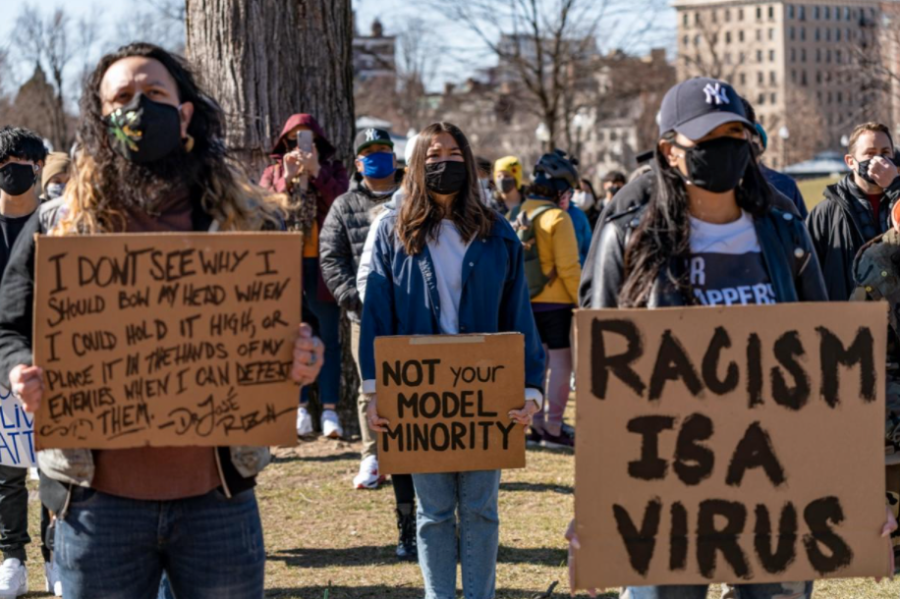April honors Asian American and Pacific Islander Heritage
Protestors at an anti-Asian discrimination rally
April 16, 2022
AAPI Heritage Month at Saint Anselm puts spotlight on Asian American discrimination
At Saint Anselm College, April is Asian American Pacific Islander Heritage Month. Throughout the month, the Intercultural Center will host several AAPI heritage events in celebration. Despite the college’s strong stance against Asian American discrimination, hate crimes against Asian Americans and Pacific Islanders are rising across the country and activists are looking for a change.
May is the national AAPI Heritage Month, but Saint Anselm celebrates in April so the community can have the whole month to celebrate without the interruptions of finals and the end of the semester. The Intercultural Center is hosting a series of events this month, which include Asian heritage movies, student-led panel reflections, and an event called “Taste of Asia.” The “Taste of Asia” event is set to take place in the Student Center where six local Asian cuisine restaurants are bringing food for students to sample. All of these events are run by the Intercultural Center and all students are encouraged to attend.
The purpose of AAPI Heritage Month is to celebrate the customs of Asian Americans and Pacific Islanders and to bring to light the hate crimes and discrimination inflicted on the AAPI community. Although hate crimes against AAPI people are rising throughout the country, Wayne Currie, director of the Intercultural Center, does not believe this is a problem on campus. “No, what happens on our campus is not a reflection of what goes on in the real world. One of the good things we do here is we have a good sense of belonging and our Asian students feel that.”, Currie said. One of the parts where students at Saint A’s can improve on, however, is limiting microaggressions. He said, “Microaggressions are things students do unintentionally but over the long term are very resentful and very harmful. People say them because they don’t know they are doing it, and the good thing about having this month is that we can highlight how these microaggressions are harmful.”
Amelia Zheng is a sophomore at the college who identifies as Asian American and repeats many of the same points. She has not experienced any discrimination on campus other than microaggressions. She agrees that life off-campus is very different than life on campus. “Off of campus, I think there’s always some type of bias. People would assume that I’m not an American citizen because I don’t look like a typical American citizen or that I don’t know how to speak English.”, Zheng said. She believes that the recent increase in Asian American hate crimes started by former President Donald Trump’s use of the term “China virus” in reference to COVID-19. Zheng goes on to say, “Because we saw him as a leader then it showed that it was ok to show hate to us.”
Although Saint Anselm doesn’t exhibit Asian American discrimination, the national trend is going in the opposite direction. According to data published by the Center for the Study of Hate and Extremism, anti-Asian hate crime has risen 339 percent in the last two years. The cities showing the highest rise in these types of crime are New York, San Francisco, and Los Angeles. Despite this unprecedented rise in hate crimes against Asian Americans, many believe that it is not getting the necessary national attention. John Yang, president of the non-profit civil rights group Asian Americans Advancing Justice, that the Asian community receives a disproportionate amount of pandemic-related hate and not enough media attention. He told NBC News, “We must bring attention to the hate that impacts all communities. The support of our allies representing diverse communities of color and diverse faith communities has meant a great deal as our Asian American communities have been under attack.”
In the last month, there have been two tragic examples of Asian American deaths in New York that were not called hate crimes by police which is causing controversy among advocacy groups. Christina Lee, 35, was followed into her apartment and stabbed to death and Michelle Go, 40, was intentionally pushed into the subway tracks with an oncoming train hitting her. With instances like these not being reported as hate crimes, Asian Americans are growing frustrated with the reporting and lack of effort being put into stopping these crimes.



